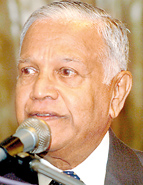Sunday Times 2
Is the clash of civilisations yet to come?
The world’s only superpower continues its diplomatic shadow boxing with its one-time super power rival Russia over the seeming imbroglio in Islamic Syria. On the 12th anniversary, a few days ago, of the 9/11 terrorist attack in New York by Islamic extremists, the United States and others mourned the thousands killed on that fateful day that seems permanently etched in the American psyche.

Prof. Weeramantry
As a consequence of this and other acts of violence elsewhere, the denigration of Islam and its followers continues unabated and Islam comes to be rejected and damned as a war-like faith with little respect for humankind, its rights and the peaceful conduct of international relations.
This widely-held view in the West, not only among the general public but even among educated and professional persons, received a rude shock when, during a lecture here in London, internationally-recognised Sri Lankan jurist, scholar and author, Professor Christie Weeramantry refused to go along with such facile conventional thinking.
If those in the West today characterise Islam as an aggressive faith and pick on words such as “jihad” to underscore its war-like intentions, Prof. Weeramantry dismissed such appellations and descriptions as a sign of the lack of knowledge and understanding of the true nature of Islamic teachings.
He does not deny that religion has been used as a tool to launch war. But that is the misuse of religion, deliberately or otherwise, by nations and rulers to justify their actions. After all, the 30 years war in central Europe, was initially at least, a religious conflict with Christians killing Christians.
What Prof. Weeramantry decries is the lack of learning and scholarship that has led even the teaching of the law to be turned into a dry-as-dust exercise ignoring the spirit of the law and the rich and fertile sources from which it emanated.
Perhaps Prof. Weeramantry’s most important contribution that day was to underline the importance of Islam and Islamic teachings to advancement of learning and scholarship which often formed the bedrock for the development of western nations centuries later.
What many of those who listened to Prof. Weeramantry did not know was his extensive knowledge of Islamic teachings and the emphasis that Islamic leaders had placed on learning and scholarship that led to highly advanced and sophisticated civilisations.
To underline this he quoted one of Prophet Muhammad’s most memorable sayings on the subject: “the ink of the scholar is holier than the blood of the martyr.”
Since the audience consisted mostly of those from the legal profession, Prof. Weeramantry enlightened them on the contribution of Islamic jurisprudence to international law and international humanitarian law. As one discovered later, much of what he said was new to his audience for the contribution of Islamic law to the enrichment of international law remained a generally unknown subject and usually not taught at western law studies.
Because of this lacuna in teaching, western students are under the impression that international law and international humanitarian law are products of western thought and evolution. This, of course, is the kind of myth on which western supremacy is built and which is easily debunked. While Prof. Weeramantry did so with quiet efficiency, it was his profound knowledge of Islamic teachings and the depth of his understanding of Islamic civilisation for a non-Muslim that impressed his audience.
Fortunately for me I had prior knowledge of Prof. Weeramantry’s interest in the subject. Faisz Musthapha, eminent lawyer, president’s counsel and a contemporary of mine at Peradeniya University, presented me with a copy of Weeramantry’s book titled “Islamic Jurisprudence” when Faisz was Sri Lanka High Commissioner in London in the early years of the last decade.
The book makes fascinating reading, though it might sometimes be a little heavy for non-lawyers. What is particularly impressive is the scholarship that has gone into it.
In the preface to Islamic Jurisprudence Weeramantry writes: “After Sept 11th 2001, more than ever before, the world needs to break through the cross cultural barriers that have prevented vast sections of the global population from understanding and appreciating each other’s cultures. Lack of such understanding and appreciation is a fertile source of misunderstandings and tensions which grow into enmities and hatreds.”
While the Christian world has never been confronted by Hinduism or Buddhism, historically the only power and cultural bloc comparable to that of the Christian world to clash with it has been the Islamic world. They have clashed in war and Islamic influence has spread to the European continent in terms of culture and learning.
It is interesting that in the last half a century or more, powerful western nations have tried to subjugate or destabilise several Islamic states, including Afghanistan, Iran, Iraq, Libya and now Syria which have refused to bow to western blandishments.
Much of it is done on the pretext of having weapons of mass destruction, installing democracy or making the world safe for the rest or some other spurious reason.
On the other hand, there are those who think it is payback time that powerful western nations are trying to destroy nations whose glorious civilisations of the past far overshadowed the western world.
To appreciate how the West, while preaching adherence to international law and respect for human rights, enshrined in Islamic teachings long before the advent of western scholars such as Grotius in 1625, is deliberately flouting them in their international conduct one needs to read Weeramantry’s book ” Armageddon or Brave New World” alongside his treatise on Islamic jurisprudence.
“Armageddon” deals with his reflections on the Iraq War and how the West – the US and Britain as the principal allies — undermined the authority and power of the United Nations for a personal crusade and interpreted UN resolutions to suit their military purpose.
comments powered by Disqus
